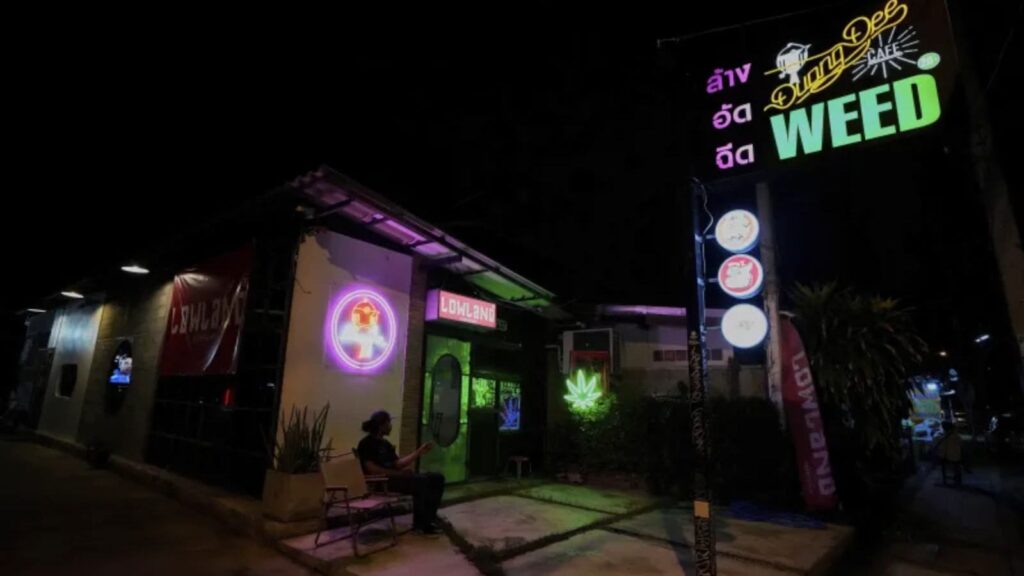970x125
Just three years ago, Thailand made history by becoming the first country in Asia to decriminalise cannabis. What followed was a rapid and unprecedented boom: neon-lit dispensaries sprang up across Bangkok’s tourist hotspots, “green” cafes dotted the islands, and entrepreneurs—from street vendors to seasoned investors—rushed in to claim a slice of the estimated $1 billion market.
970x125
But that cannabis free-for-all may be coming to an abrupt end.
In June, the Thai government imposed sweeping new rules that re-criminalise recreational cannabis use, triggering panic among shop owners and raising uncertainty over the future of the country’s burgeoning marijuana industry. The new guidelines require all cannabis purchases to be backed by a prescription from a certified medical professional. However, the practical implementation of this policy—how prescriptions will be issued, how shops should adapt, and what will happen to existing businesses—remains murky.
The abrupt change has left many wondering whether Thailand’s short-lived experiment with legal cannabis is now over.
From boom to bust?
Since decriminalisation in 2022, thousands of dispensaries have opened across Thailand. Along Khao San Road in Bangkok—a famous backpacker strip—bright storefronts have offered a smorgasbord of highs: cannabis strains promising everything from relaxation to euphoria, with catchy names and menus written in English.
But after the government’s announcement, many shops are bracing for shutdown.
“Most of the registered shops will shut down,” Bangkok-based entrepreneur Natthakan Punyathanaworakit told The Guardian, adding that many are likely to go underground. She has already closed one of her three cannabis stores in the capital, citing mounting pressure and the cost of compliance.
Story continues below this ad
The new regulations could force dispensaries to register as clinics and hire licensed doctors—an expensive and bureaucratic shift that small businesses say they cannot afford.
“It’s the little guys—the mom and pop shops, the family business where the wife is helping trim while the husband is growing—they’re the ones that will suffer,” cannabis entrepreneur Chokwan Chopaka told The Guardian.
Chokwan, who once welcomed Thailand’s progressive approach, now fears the rollback will only entrench big players and criminalise small-scale operators again. “Even past rules weren’t properly enforced. When there’s no enforcement, there’s just no way I can compete,” she said.
Politicised plant
The shift in policy comes amid a political shake-up. The Bhumjaithai Party, which had pushed for decriminalisation, has now exited the ruling coalition. Thai Prime Minister Paetongtarn Shinawatra, facing criticism over his handling of other political issues, has leaned on health minister Somsak Thepsutin to oversee the reform.
Story continues below this ad
Somsak has framed the new rules as necessary to “improve public safety and protect young people and children.”
But critics argue that the cannabis issue has become politicised. What started as a reform aimed at reducing drug-related incarceration and boosting the economy has become a lightning rod for conservative backlash, fuelled by concerns over youth exposure, cannabis tourism, and smuggling.
The previous decriminalisation, while historic, was widely criticised for being rushed through with minimal safeguards. Piecemeal regulations followed—such as bans on sales to minors and pregnant women, or in proximity to schools—but enforcement was spotty.
Now, the pendulum is swinging hard in the opposite direction.
Story continues below this ad
Tourists back away, farmers fear collapse
At Khao San Road, footfall has already dropped. “It’s going to affect [profits] because the tourists, they’re scared,” Thammarat Siritanaratanakul, who works at a dispensary called iStoned, told The Guardian.
Oler Silasilarat, 28, who works at Hygge Flower, said he supported reforms in principle, but feared for small farmers. “They have a lot of knowledge, but they cannot grow any more because they cannot compete with the big companies,” he said.
“After legalisation, everyone had the opportunity to try to make money. You could open a shop, you could make a career,” Oler added. “And then they change it.”
Small growers will now be required to obtain new certifications, while dispensaries must convert into medically licensed businesses or risk being shuttered.
Story continues below this ad
For many, the cost of adapting to the new system is simply too high.
From progressive to punitive?
Decriminalisation had marked a sharp reversal in a country long known for its harsh anti-drug laws. Thousands of people jailed for cannabis-related offences were released, and Thailand’s leaders positioned the policy as a symbol of progress and economic rejuvenation.
But the explosion of dispensaries and a flood of marijuana into the market stoked public unease. Reports of cannabis smuggling and arrests of foreign nationals added to the controversy. Earlier this year, two young British women were arrested in Georgia and Sri Lanka after flying from Bangkok with large quantities of cannabis; both now face prison.
Despite the backlash, many argue that rolling back legalisation is not the solution.
Story continues below this ad
“What we needed was proper regulation—not criminalisation again,” said Chokwan. She fears that closing dispensaries will only revive the black market, pushing users and growers into legal limbo.
Back in Bangkok, Natthakan is holding on to her two remaining shops—barely. “If one of the shops cannot keep up with the new rules,” she said, “I will have to close.”
Thailand’s green rush may not be over yet—but the haze of uncertainty is thick, and its once-celebrated weed wonderland may soon become a cautionary tale.
970x125

